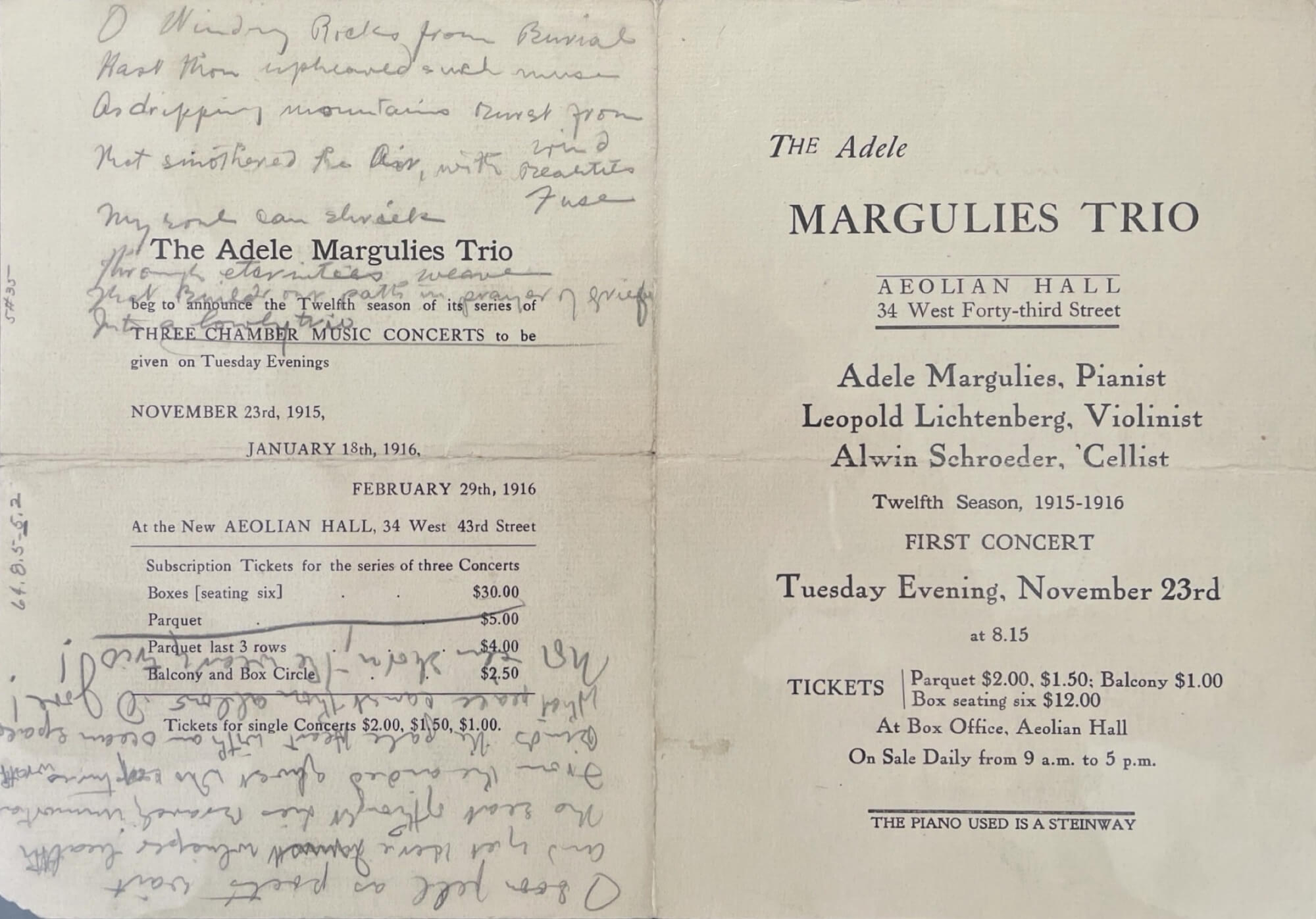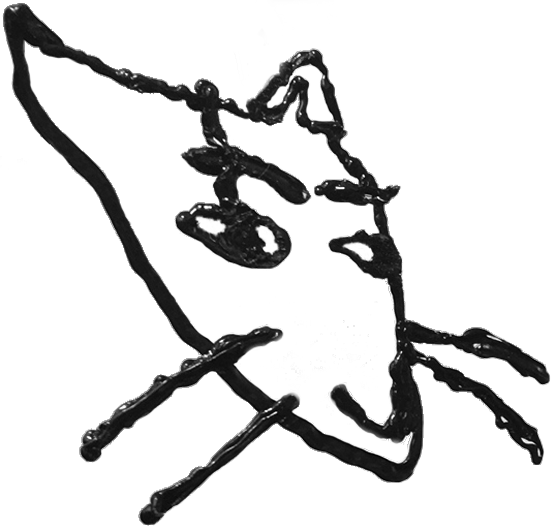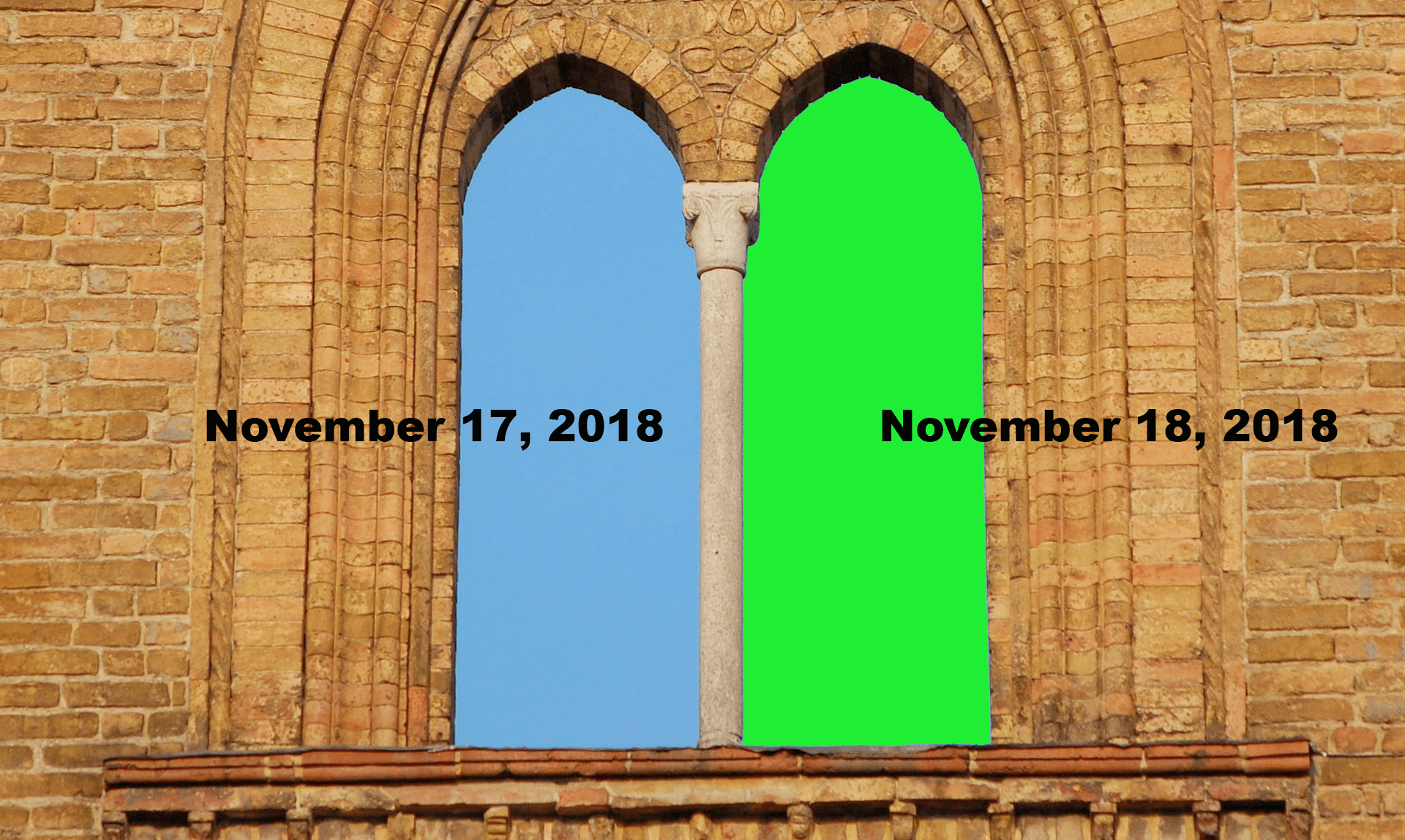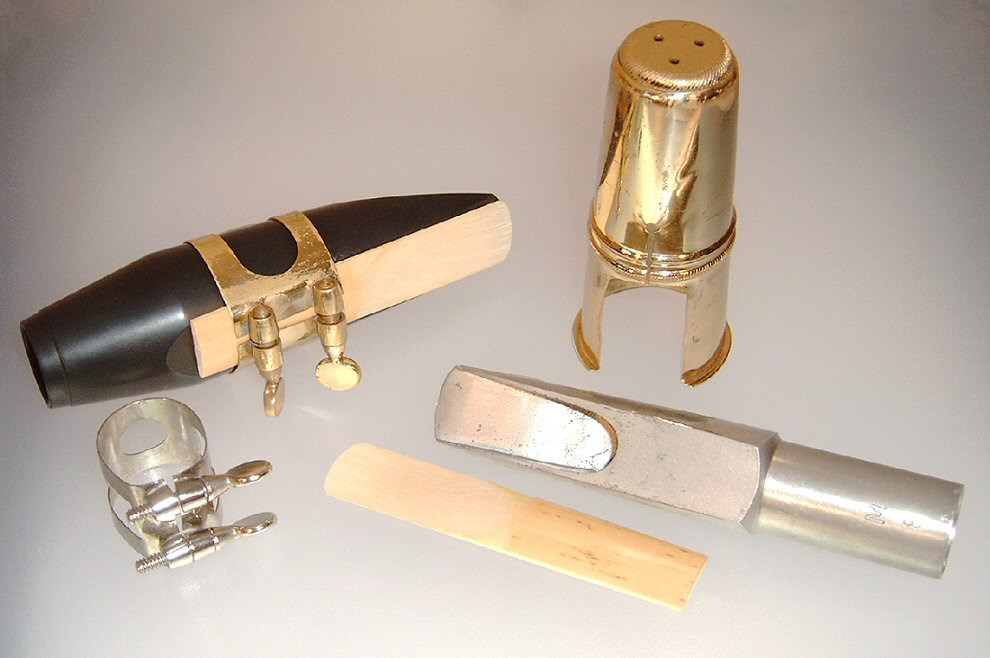Poems by Samuel B. Greenberg
The following are poems and writings by Samuel B. Greenberg (1893-1917), selected and edited from his original manuscripts. Elsewhere in this issue I have written an essay which addresses Greenberg’s life and work, its publication history, and the particular poems here published. Briefly: Samuel B. Greenberg was born in Austria in 1893 and at the age of seven emigrated with his family to New York’s Lower East Side, where they lived in relative poverty. Greenberg attended public school through junior high, at which point he left school to begin working. At around 18 years old he contracted the tuberculosis which would kill him at 23. During his confinements in various hospitals and sanitaria, he began compulsively jotting the mountain of poetry and other writings which would be his short life’s work, though none of it was published in his lifetime. While some selections have been made available (see accompanying essay), much of it still remains in unpublished manuscripts housed as part of the Fales Manuscript Collection at NYU, from which the present selection was made.
— Henry Cole Smith
Motives
There was a youth
who claimed a fancy
and when he began to sing,
this lore would from him
spring!
Who made the heavens
that drifted colours dry?
Who feeds this dew
that dayly must be nigh?
What stain is this
that shines the tale of light
and this realm called night?
What wrought this space
and the windy flurs by chance
and who built the spirit from
which this love
doth spring?
Literature Listener
The devil—and man—the rathful beast
Is halted—when voice relieves—
The awkward sin
That which is will in mankind
The decayed rock from its displacement
Cracks far beneath its mount
And repeat echo, in solitude valley
Attracts the spirited haunt
Sense awakens acknowledge to the heart
The ponderers—in realm of pleasure
O e’er it sways—its celestial divine
Enshrines its gathered treasure
The repeated psalm, that illumines warm
Decidement spread within
And there where culture has its tune
Until the passions are gone!
Give me freedom! The vowel doth read
Freedom, to spread thy will
So that I can just appeal
To those whose impulse thrill
But here spell of man is high
Sooth him on and on
Oh! abbé read thy verse again
Until my soul is strong
An Ode to a Trio
[A draft of the first three stanzas below appears in the Greenberg manuscripts written across a folded program for a performance of the Adele Margulies Trio at Aeolian Hall (see image above), suggesting Greenberg may have begun writing the poem during or just after attending the concert. – Ed.]
The step of ween
But once doth cease withal
The step of love, alacrity of bust
Can I tie such strain
As the joying dreaming refusing
The band of velvet dew
I soon closed the impulse of haste
Upon a wicked trio
O winding rocks from burial
Hast thou upheaved such muse
As dripping mountains burst from wind
That smothered the air with beauty’s fuse
My soul can shriek
Through eternities weave
That builds our path in prayer of grief
Into a lowly trio
I soon fell as poet’s wait
And yet here I must whisper health
The seat of thought lies bravely immortal
From the aided ghost who captures wrath
Binds the pale heart with an ocean space
What peace canst thou allow O Jove!
Not e’en shorn, the weary trio
O master bell of love and joy
The cloisters of Egypt marked thy brow
And opened the tempest within thy gall
The shed of silver varnishing thrall
The dote of Hindus passionate glow,
O mortal trio, ease beneath thy pain
The wandering roar that forges strain
From the blessed trio
Beauty
Beauty is the danger of our delicate eyes. If beauty could hold away her real dress, we would see our only state as heaven was under the earth of life’s contribute evolvement. Vanity never fails—no let me say that if it did not fail there would be no value to life. Thus the question phases classical favor. Beauty in a perfect term is vanity of light and shade. Beauty is existence. Beauty is stupid sleep—sleep of nature. What one has claimed to owe makes one laugh because of his feign in real desired possession of falsehood. —All givers play the game of beauty as to ping pong contest reassured—what more can be said is not my duty, but beauty’s love!
Delicious Fruit
Good fruit deceiving our essence and innermost feeling
Having fragrant delicious unequal taste
Leaving us paste a grain enjoyment
As a dewy garden—fed by the thread of sun-beamings.
Butterfly
Music seemed to swell from a winged butterfly
Early spring was budding through the branches
And the softness of my entailed impressive sigh
Caught! was this beating restless silk worm in the bushes
An old large whipped effulgent queen sect
Powdered! O how the breeze did blow its richness away
As a lonely rose on some cliff wild earth
Every morning grew lesser and strewn to decay
Still in on looking sought I more verse,
Though sympathy—I princely feel,
My God, such delicacy—I cannot love
For I eat too fast!—nature’s heart stupedly.
Man
Always alone star told?
Wait and hope is ‘quiry?
What tale, are bone and skulls?
O thou nigh art a lost mine!
Quite true, we dug gold out
Of thee! Wilt thou build shadows?
Cause them thicker then now?
A trip to the moon, perhaps—
Will turn heaven’s eye real
Thy flex form is good currant
O burning statue of tendons
Time loses thine eye
Eye Borrows Eye
My room was astir
with the mess of scraps
that played my will
from sea, earth, of maps,
What lore canst thou not learn
that breathes the life
from vestments yearn
and tends a pressure strife
O reflective glace of heed
that brakes e’en ties of power
and seems to play with a poet's greed
the phantom hymn of the hour
Dark Images
Ye unknown colossals!
it took him
to find the wormth
in thy breast of fossils
O cold days of lampid frost
not e’en spares mercy
at thy kneel hath cast
thy ever shade of meaning traced
Ah this unceasing rechain,
canst thou not tell
a brother whence thou roam
yet still seek in dark moods
and feel this hindered ween
thy looming images before me sworn
The Thorax
Pulsation! vibrating strangely between ribs!
O the invisible thumping of silence
While soothing on, with pain drawn
Its path is still a path!
What holyness can shine this wooing rath
Thus blown in time, when gone!
Mountains, fields, and cultured rocks
With mingled details, with specks like dots,
Where lovers stroll—where battles sank!
Where the common seagull rests abank
Whales that build their fountains own
The breast must heave like an envil tank
World! the step within, one likes to muse
O’er step and wave behold a universe
Where maidens quiver no beauty fraud!
Where the honest soul gives way to God!
Where beggars limper along a hearse!
The breast thus deep—must bare this course
O! Youth! Flowers seem autumn to thy spring!
Where the craze of love must heavenly sing!
Where the cramping devil aside must thrust
Thy earnest play on the fielded dust
Though poets merely smoke thy charms
Their breast, like the earth—divinely floats on
Temples of windows painted or laid
Where the passerby looketh on in a shade,
Where the hunter bares fruit, while a cutlass suspence
To vice he must bow, end in prison hence
Remain for the rest of his years in gloom
While his breast, must heave the tight tombed room
Poets of Old! young! and new—
Their lyric blasts did spirit construe!
Where paradise lost—is paradise gained
A Milton, Wilde Wordsworth Keats!
Have sent their laurels—where mankind reined
The phase of love, chant—and hymn
The spiritual breast did sportive dim
And the dread of the victims common
Like birds the “eagle” “hawk” or perch
That float like the daylight sharpened tooth
O’er sea and land—o’er swamply growth
From east to west, north to south
Their wildly heaving in prey of search!
In turn, a whirl, the darkness sets
While the christened natural man,
With his mystic view—way, where, when, who?
Like the sun—with its cultured tan
When manly instinctive bares in view
The soul—spirit, in his wonderful hand!
Coming to New Year
To knowledge that caresses the self disappointment, round about we see great masses of ease erected for the benefit of the beholders at large, not to acquaint the reader with lone feelings like sickness and health of the mannered human soul, which keep his early stage of wisdom hidden like some ugly treasure hunter’s disappointment. The fault always springs before you as you awake in the morning a child in exile and who is the perceiver of just love? As for this script I’m being served supper in a sanitarium and must abandon quick—here—now over—this supper isn’t the last one, as for medicine for the stomach a double barrel pill and finished.
How ever I am to find rest is now a problem. It does make me afraid to put any thought upon paper, because of the self respect to grace of meditation, voices of the bystanders are always sounding like callers in the wild wide air of romance and knight. But when I gazed what we were preparing to explain—a bundle of clothes ready for the night’s rest—it is now fairly towards evening, the sun lets no grace grow through, in the room it designs the walls and furniture with its balming home color of yellow-gold. What else may be the case of daily acquired observation rests now into the sullen try of reflection upon the self’s spirit.
* * *
[The following poem is the first from a series which were written on pages torn from a small daily calendar-notepad for the year 1916. This one appears under the printed heading: “Saturday, January 1”. – Ed.]
With a cough I awoke
and the memory of noise
that pealed the last eve
with a shape unguise
O morbid dream, unfelt
That panting whirling sphere
Of silent utter air black melt
Next morning to revere
The day was spent to see
With relatives, deep love in glee
* * *
I am weak and most betortured!
The swallow that flew!
In his peaceful grace—
O God! take my soul I forfeit!
Like the bird that vanished!
in space!
A cloud is my home! The body in conscience
Is born in a weary clime
While I trail along
In resistful transience!
Void of self, song
and time!
Naught! What an idea!
Ah! there’s my chain, can you see it?
A puff, called cloud!
strolls o’er the pavement
In seeming behavement
aloud!
What do you write? a nurse asked!
While conscious gave me a quiver
She skwirted a bulb in a wash basin
Nor careless—nor waver
Replied I calmly, verse! with no end even!
Woes of an Invalid
Reading a book! I’ll write something of
My burning spell—to hell
With the results of momentary love
Thy face is heated or burning,
Which? That, I cannot tell!
Ah! women! physicians! porters!
A trifle to this wound I perceive,
Their bend to help! Mine to grieve!
What art can this mean, while they leave?
Yes! I want acknowledgment,
My breast wants rest!
What else can I name—to thy aided fame
Like a ship that sinks of defiance
Sonnet to Death
O Loose way of self unbounding force
In what way can we remember man
As thou dost here forebode a source
The stolen joys of saints untold a feign
Wreckless doom, who art thou, to flower?
Where spearest thou us alone for hell
I can no more fetter chase or dower
Thy moaning sack, unmoaned in fell
A breath of goodness dost thou cast
And yet sayeth natural a bow!
Thus makest thou us untrained a beast
As the forts of defence know how
Whither way? Halt not thy mien a ditch
If it could be, that thou art sound, an evermore
ever pitch
* * *
[The following diaristic entry is made the more poignant by the knowledge that Greenberg had just less than a year to live from the time of its writing. He died the evening of August 16, 1917, four months shy of his 24th birthday. – Ed.]
The day is August 27, 1916 and what I would like to relate in figures can not be put on paper. We are apart to ascertain that life at large is truly love in the wilderness. Here about me near a window has lured me to pick up this tablet so as to tell the self a bit of interest when ever it is ready from a point of view and can closely make clear observations of the day in August. The great pretty sky has its simplicity of lumination without clouds and the earth is doubtfully vested over the surface. Hours of stillness interrupt to make way for the sawing insects, a sound that does give many a spirit the research formula. The books of the West Endies or Japan have curious details advertised to that effect and curiosity. It is still foggy and serene light and darkness are not envied by the medium of thought, we are growing to its part—the earth is [illegible] as a [illegible] grotto without gates, and the paths which are uncultivated seem to show their sorrow laden beauty reason to explain. Sunshine is not [illegible] enough in its station, having thought that the sky is weather stricken plain and [illegible] to sleep in white behavior as usual. Now, a change has taken place since the above description was observed: it became clearer and brighter, much warmer and the staring zizzle of the grass chirpers were giving its summer power and joy in full. It is momentous desireful to rehearse a living content. My youth is not a flourishing one—just as simple and unsatisfactory to memory as it would be to those of a high aspiring deploration. The world is very interesting to me, although my chances for education and practice is limited by natural care and use. It is a very good thing that we may cherish normal philosophy like—existence of quality is not ours! Yes—and further to elucidate its minutest strike reveals blistered bubbles of memories’ youth—presence is the rejuvenator—my total care is banished to recall precious hours of nearest channels that misery provides to beautify. Surely I have nothing to write that may be of any importance, for it is only life’s way of vainness and self vanity of sentiment, not a curse for a water drip of sunny sparkle. I am not well to-day and it is depressing to my clarity of senses. To write as little as possible in abstract philosophy, even what I see should not find refuge to explain.




